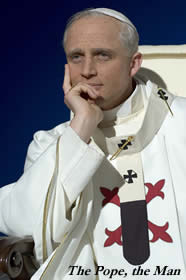 Cinema Without Borders: Your performance playing Pope in The Pope, The Man is magical, how did you achieve such a difficult task?
Cinema Without Borders: Your performance playing Pope in The Pope, The Man is magical, how did you achieve such a difficult task?
Piotr Adamczyk: It is so difficult to explain how. I was asking for a miracle, and I have been given many miracles I was 35 years old when I got this offer to depict his whole life his youth, and the last moments of the life of the holy father. I didn’t think it was possible, I remember the, and who knew him personally. He has the great gift that even in a moment I met the Holy Father, I was blessed by him. That was the moment when I started to believe that what I thought was impossible was possible. For me personally it the most difficult task I had ever had. I was playing Chopin once and that was something that was very difficult. We know his life very well, and it was trying to be credible with his imagination, and trying to be as in tune as possible with the imagination. I have the task now of being in tune with the memory of the people for whom the Holy Father was the most important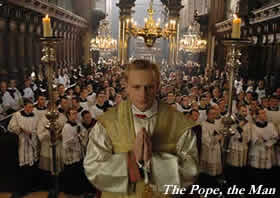 authority, and who knew him personally. He has this great gift that even in a crowd of thousands of people, everybody thought he was contacted them personally. It was like playing somebody from the family of the viewer. The way that was chosen to portray him by Giacomo Battiato, director of the film was not to copy his gestures, but trying to be as delicate in the performance that would not disturb the viewer in this genre of recalling emotions connected with the Holy Father.
authority, and who knew him personally. He has this great gift that even in a crowd of thousands of people, everybody thought he was contacted them personally. It was like playing somebody from the family of the viewer. The way that was chosen to portray him by Giacomo Battiato, director of the film was not to copy his gestures, but trying to be as delicate in the performance that would not disturb the viewer in this genre of recalling emotions connected with the Holy Father.
CWB: Did your religious beliefs help you to play this part or it had nothing to do with it?
Piotr: It helped me understand the character, but it is so difficult to speak about faith. Faith helped me more as a 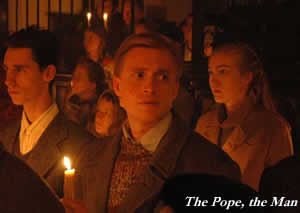 man than as an actor. It helped me with the journey to complete this task, as an actor it did help that I was a catholic because I knew the catholic behavior and spirituality. I think this could be a problem for the filmmaker devoted to their religion and trying to portray the spiritual leader. There was a story about a Polish painter who wanted to paint god and for a few years he wouldn’t dare touch the canvas because he didn’t know how to start. The painter had a dream and god appeared to him and god said, “Do not paint me down on your knees, paint me well.” This is what we wanted to do in the story of the Holy Father. There is a scene, an important scene with Leslie Hope woman who is a doctor who is asking very simple questions every catholic is asking everyday, she
man than as an actor. It helped me with the journey to complete this task, as an actor it did help that I was a catholic because I knew the catholic behavior and spirituality. I think this could be a problem for the filmmaker devoted to their religion and trying to portray the spiritual leader. There was a story about a Polish painter who wanted to paint god and for a few years he wouldn’t dare touch the canvas because he didn’t know how to start. The painter had a dream and god appeared to him and god said, “Do not paint me down on your knees, paint me well.” This is what we wanted to do in the story of the Holy Father. There is a scene, an important scene with Leslie Hope woman who is a doctor who is asking very simple questions every catholic is asking everyday, she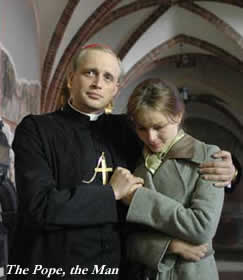 is like the voice of critics, and the Pope has very simple answers for the questions. It is not the film down on “our knees”, but with a great respect for the Holy Father. I hope it is truthful that is what we wanted to do.
is like the voice of critics, and the Pope has very simple answers for the questions. It is not the film down on “our knees”, but with a great respect for the Holy Father. I hope it is truthful that is what we wanted to do.
CWB: Does this movie touch people from other fates or non-believers?
Piotr: I met Muslims who saw the film and their reaction were incredible. They saw the film as a story of a man who is lonely fighting for peace and nobody is listening. The film is close to the message of the Holy Father, which is against violence and war. It is about humanity, the very simple and important issues in our lives. No matter what religion the viewer is, the movie is about human values. I would not call it a religious film. 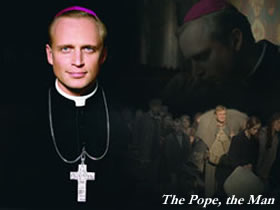 CWB: Please tell us about US distribution of The Pope, The Man.
CWB: Please tell us about US distribution of The Pope, The Man.
Piotr: The first part was shown on the Hallmark channel after the death of the Holy Father. We did this film before his death. The worldwide rights for the first part were held by Universal pictures. I hope it is still in DVD shops distributed in the Unites States. I don’t know the producers plans and the distributor’s plans for the future. As far as I am concerned the second part of the film is shown in Europe, in cinemas in Mexico, and released in DVDs in Canada which co produced this Italian Production. It was not released in the US, that was actually the American west coast premier in the spring here.
CWB: What is the state of Polish cinema today, comparing to its standing before the revolution?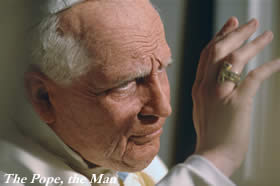
Piotr: It may be strange, but it is true that the most well known directors of Poland and the most well known Polish film are from the very hard political times in Poland. Fighting against the regime, Polish artists do exceptional and amazing work. Right now when we got the freedom the business is going around the money. So we had this trap at the beginning, trying to do a lot of films like Americans do with Hollywood like productions, which didn’t work at all. Right now I am very happy, thanks to the new law in Poland, and thanks to the establishment of new polish film institutes, which is donating the co productions and 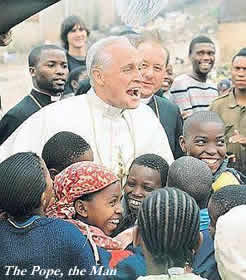 screenplays. With all this we are going back to the good habit of doing the films about ourselves, about nowadays problems, and about human values. We should leave Hollywood productions for Hollywood.
screenplays. With all this we are going back to the good habit of doing the films about ourselves, about nowadays problems, and about human values. We should leave Hollywood productions for Hollywood.
CWB: What are the projects that you are involved now and plan for the future?
Piotr: After climbing my own personal Mount Everest, my dream is to continue climbing as an actor. In Poland I had an opportunity to play in a comedy called “Testosteron”, about an average funny character and a lot of viewers were surprised. As I have described in this interviews that an actor plays and depicts and I have to play different characters. I am also a theatrical actor, it was a new task for me to play in Italian in The Immigrants of “Slawomir Mrozek” the well known Polish author and dramatist. The premier was in Rome early June. For me it was a great task to act in a different language. It was in Italian which I don’t speak very well, but I had an opportunity to listen and learn it during my work on the two parts of Carol. These were produced by Italian crews.
known Polish author and dramatist. The premier was in Rome early June. For me it was a great task to act in a different language. It was in Italian which I don’t speak very well, but I had an opportunity to listen and learn it during my work on the two parts of Carol. These were produced by Italian crews.
CWB: Do you think Polish Film Festival, Los Angeles, that was held in late April and early May 2007 could play a part in introducing new Polish cinema to the American audience?
Piotr: I believe that this festival year after year is becoming more important, and I hope that American viewers will come. At the beginning the festival was for Polish immigrants who wanted to get in touch with their Polish culture. I have had an opportunity to be there last year, and this time I have noticed more of an interest in the Americans at the festival. Hopefully this will develop. To show our work in the heart of the filmmaking is great as soon as the producers will attend and see what is going on in Poland. I know that a lot of good ideas come from having his place of birth in Europe. So I would like to invite filmmakers to see our work because maybe they could pick up some ideas for the future films. As used to be eight years ago a lot of great directors were basing their work on other great Polish.
be there last year, and this time I have noticed more of an interest in the Americans at the festival. Hopefully this will develop. To show our work in the heart of the filmmaking is great as soon as the producers will attend and see what is going on in Poland. I know that a lot of good ideas come from having his place of birth in Europe. So I would like to invite filmmakers to see our work because maybe they could pick up some ideas for the future films. As used to be eight years ago a lot of great directors were basing their work on other great Polish.
CWB: Please tell us what were the latest interesting movies you have seen?
Piotr: I am a great fan of Babel because it is depicting the moment in our global village life, and it helps understand the difference that exists in our world. Filmmakers have power to explain difference and through this, tolerance is growing.

